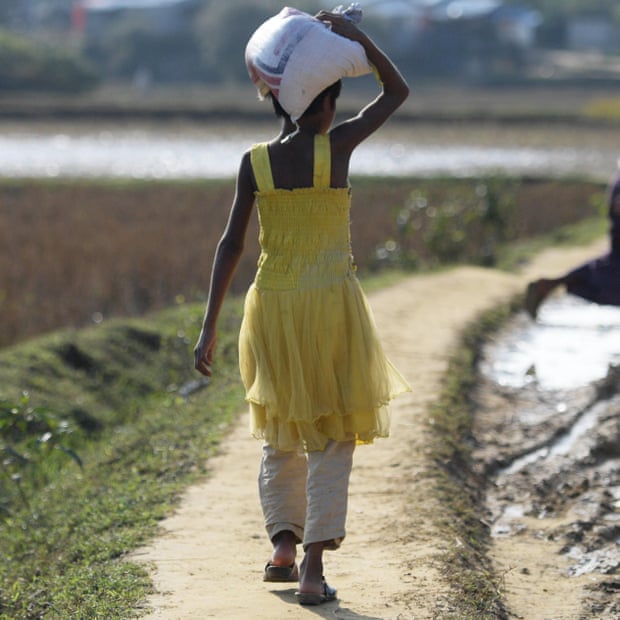For decades the Rohingya have been denied recognition in Myanmar, but the persecuted minority is close to securing a crucial symbol of their identity – their own unique digital alphabet.
The language of the stateless Muslim people has reportedly been included in the planned upgrade to the Unicode Standard, the global coding system that turns written script into digital characters and numbers.
It would allow the Rohingya to write emails, send texts and post on social media in their own language – a major step for a people who had no written script until the 1980s.
Victims of violent oppression in Myanmar that has been likened to ethnic cleansing, many Rohingya face far more pressing concerns than searching Google or sending a tweet, and most lack not just the technology but the literacy to do so.
But experts say giving the Rohingya a digital script of their own is hugely symbolic for the recognition and survival of the marginalised people, even if it is not adopted quickly.
Q&AWho are the Rohingya and what happened to them in Myanmar?
Show

Described as the world’s most persecuted people, 1.1 million Rohingya people live in Myanmar. They live predominately in Rakhine state, where they have co-existed uneasily alongside Buddhists for decades.
Rohingya people say they are descendants of Muslims, perhaps Persian and Arab traders, who came to Myanmar generations ago. Unlike the Buddhist community, they speak a language similar to the Bengali dialect of Chittagong in Bangladesh.
The Rohingya are reviled by many in Myanmar as illegal immigrants and suffer from systematic discrimination. The Myanmar government treats them as stateless people, denying them citizenship. Stringent restrictions have been placed on Rohingya people’s freedom of movement, access to medical assistance, education and other basic services.
Violence broke out in northern Rakhine state in August 2017, when militants attacked government forces. In response, security forces supported by Buddhist militia launched a “clearance operation” that ultimately killed at least 1,000 people and forced more than 600,000 to flee their homes. The UN’s top human rights official said the military’s response was "clearly disproportionate” to insurgent attacks and warned that Myanmar’s treatment of its Rohingya minority appears to be a "textbook example” of ethnic cleansing.
When Aung San Suu Kyi rose to power there were high hopes that the Nobel peace prize winner would help heal Myanmar's entrenched ethnic divides. But she has been accused of standing by while violence is committed against the Rohingya.
In 2019, judges at the international criminal court authorised a full-scale investigation into the allegations of mass persecution and crimes against humanity. On 10 December 2019, the international court of justice in The Hague opened a case alleging genocide brought by the Gambia.
“If a people do not have a written language of their own, it is easier to say that as an ethnic group you don’t exist,” said Mohammad Hanif, who developed the writing system for the Rohingya language in the 1980s.
“It is easier to repress them,” said Hanif, a Rohingya madrassa teacher living in Bangladesh.
This is especially the case with the Rohingya, with Myanmar even refusing to use their name. Myanmar refers to them as “Bengalis” instead, painting them as interlopers from Bangladesh even though many of them have lived in the country for generations.
Experts say language is part of the issue, with Rohingya speaking a dialect of Bengali understood in Bangladesh’s southeastern Chittagong region, but foreign to the Buddhist majority in Myanmar.
The minority group has been driven out of Myanmar’s westernmost Rakhine state in waves of systematic violence, most recently in an army campaign that Doctors Without Borders say killed at least 6,700 Rohingya Muslims in its first month.
Nearly 650,000 Rohingya have arrived in Bangladesh since the military crackdown began in August, escaping arson, rape and murder in their homeland.
The Rohingya had no written script until Hanif – an Islamic scholar who fled Rakhine in an earlier surge of violence – began studying the nuances of the language.
Hanif said around 50 books have now been written using the script, which is also taught in some faith schools catering to the Rohingya in Malaysia, Pakistan, Saudi Arabia and Canada.
Other attempts at developing a writing system had used Arabic, Urdu and English scripts, the latter known as “Rohingya-lish”.
But “Hanifi Rohingya” may be the one to be encoded by the Unicode Consortium, a nonprofit that oversees the global standardisation of digital characters and numbers.
A representative for the US-based consortium told AFP by email that Hanifi Rohingya was one of the scripts being considered in the next version, but a final decision would be made in February.
If approved, it would allow the global Rohingya diaspora – including, eventually, the more than 800,000 refugees in Bangladesh – to send messages through chat services like WhatsApp using their digital alphabet.
“[This] legitimises the struggle of the Rohingya language and its much persecuted people,” said Muhammad Noor, a software engineer who built a computer typeface for Hanifi Rohingya compatible with word processing, but not online usage.
Translators Without Borders, a nonprofit providing translation services for charities in crisis zones, said the importance of taking the Rohingya language into the digital realm could not be overstated.
“It is revolutionary,” the charity’s Rebecca Petras said in Cox’s Bazar, where the Rohingya camps are located.
“In order for the language to survive, a script is necessary. This would strengthen the language and go a long way to preserve it.”
